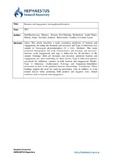| dc.contributor.author | Martinussen, Monica | |
| dc.contributor.author | Borgen, Per-Christian | |
| dc.contributor.author | Richardsen, Astrid Marie | |
| dc.contributor.author | Mandy, Anne | |
| dc.contributor.author | Pavlakis, Andreas | |
| dc.contributor.author | Raftopoulos, Vasilios | |
| dc.contributor.author | Cossman, Lynne | |
| dc.date.accessioned | 2015-12-18T14:36:41Z | |
| dc.date.available | 2015-12-18T14:36:41Z | |
| dc.date.issued | 2011 | |
| dc.identifier.issn | 1741-1645 | |
| dc.identifier.uri | http://hdl.handle.net/11728/6798 | |
| dc.description.abstract | Aims: This article describes a study examining predictors of burnout and engagement, including job demands, job resources and Type A behaviour, in a sample of Norwegian physiotherapists (N = 244). Methods: This study measured demographic and work characteristics, job demands, job resources, burnout, work engagement and type A behaviour for all members of the sample. Findings: Both job demands and resources predicted burnout and engagement, and after controlling for these factors, Type A behaviour patterns accounted for additional variance in both burnout and engagement. Finally, Type A behaviour (Achievement Strivings and Impatience-Irritability) moderated several of the predictor-burnout relationships. Conclusions: These findings support the need for studying personality traits in addition to work related factors when predicting both positive and negative work related emotions such as burnout and engagement. | en_UK |
| dc.language.iso | en | en_UK |
| dc.relation.ispartofseries | International Journal of Therapy & Rehabilitation;Vol. 18, Issue 2 | |
| dc.rights.uri | http://creativecommons.org/licenses/by-nc-nd/4.0/ | en_UK |
| dc.subject | Maslach burnout inventory | en_UK |
| dc.subject | Occupational stress | en_UK |
| dc.subject | Physiotherapists | en_UK |
| dc.subject | Type A behaviour | en_UK |
| dc.title | Burnout and engagement among physiotherapists | en_UK |
| dc.type | Article | en_UK |
| dc.doi | 10.12968/ijtr.2011.18.2.80 | |


